We May Be Nostalgic, but We’re Not out of Ideas Just Yet
Millennials Are Not the Only Ones Guilty of Repeating the Past
Photo by Scott Gries/Getty
As 2016 comes to a close, many people – especially those in entertainment or pop culture journalism – spend time reflecting on what really resonated with them in the past 365 days. Like previous years, 2016 was a year of remakes and reboots. Lots of remakes and reboots – from the controversial girl power-fueled Ghostbusters and the live action Pete’s Dragon that people have already forgotten about, to the classic tropes that we’ve grown to love in the Netflix mega hit Stranger Things. We even got to catch Pokemon again this year and see what Lorelai and Rory have been up to in the past decade.
Donning Doc Martens and chokers galore, and sharing “only people born in the ‘90s will understand …” listicles, there is no denying that the ‘90s, and even the early ‘00s to a lesser extent, were certainly back in full force this year. While the fact that millennials have had the chance to embrace the things they loved back in elementary or middle school all over again is rad, it hasn’t been without some critique. “Millennials are running out of ideas,” and “they need to let go of the past,” were phrases frequently uttered, typically by older counterparts. And while we can admit that some forms of reboots are certainly doomed to be mediocre at best – like, is the made-for-TV American Psycho still happening? – some of this year’s throwbacks were actually pretty fantastic.
Early Onset Nostalgia
There have been countless thinkpieces regarding how millennials are experiencing early onset nostalgia because our senses of time have been warped by the whirlwind of technological advances in our lifetime, and the fact that the world and economy has been pretty damn awful since we’ve become adults. Apparently we yearn for simpler times when all we had to do was remember to feed our Tamagotchis, rather than worry about whether we’re ever going to be able to buy a house. “Nostalgia marketing” is even a new trend in sales, hellbent on tugging at millennial’s heartstrings to sell us stuff.
“Share a compelling blast from the past with a millennial, and you’re likely to reach them on an emotional level – the holy grail of brand marketing, says an article in Forbes.
While most people in their twenties would surely appreciate a Backstreet Boys sing-along, or some other ‘90s or early ‘00s-based ploy to get our attention, this isn’t anything new. It’s a long-held belief that fashion and pop culture cycles last about two decades. For example, Grease was released in 1978, allowing people to relive the nostalgia of the 1950s. In the 1990s, the platform shoes and the bell-bottom jeans of the 1970s were revived. In the early 2000s, ‘80s parties were all the rage and the skinny jean experienced its renaissance, and now, we’re all about grunge gain. Of course, there are exceptions to this rule – Mad Men didn’t have to wait for another revival of the ‘60s to be a hit. So really, are millennials a different case?
-

-

-

-

-

- Curated Home Page Articles By Test Admin October 21, 2025 | 3:10pm
-

- Curated Home Page Articles By Test Admin October 21, 2025 | 2:57pm
- Urls By Test Admin October 21, 2025 | 2:57pm
- Curated Home Page Articles By Test Admin October 21, 2025 | 2:55pm
-

-

-

-

-

-

-

-

-

-

-

-

-

-

-

-

-

-

-

-

-

-

-

-

-

-

-

-

-

-




































